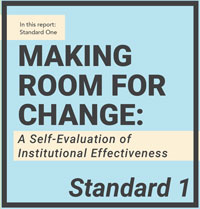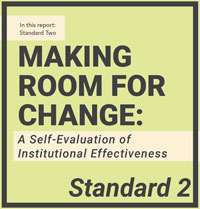Accreditation
Cascadia College is accredited by the Northwest Commission on Colleges and Universities (NWCCU).

Accreditation of an institution of higher education by the Northwest Commission on Colleges and Universities indicates that it meets or exceeds criteria for the assessment of institutional quality evaluated through a peer review process. An accredited college or university is one which has available the necessary resources to achieve its stated purposes through appropriate educational programs, is substantially doing so, and gives reasonable evidence that it will continue to do so in the foreseeable future. Institutional integrity is also addressed through accreditation.
Accreditation by the Northwest Commission on Colleges and Universities is not partial but applies to the institution as a whole. As such, it is not a guarantee of every course or program offered, or the competence of individual graduates. Rather, it provides reasonable assurance about the quality of opportunities available to students who attend the institution.
Inquiries regarding an institution's accreditation status by the Northwest Commission on Colleges and Universities should be directed to the administrative staff of the institution. Individuals may also contact:
Northwest Commission on Colleges and Universities8060 165th Avenue N.E., Suite 100
Redmond, WA 98052
(425) 558-4224
NWCCU website
Accreditation by the Northwest Commission on Colleges and Universities refers to the institution as a whole. Therefore, statements like "fully accredited" or "this program is accredited by the Northwest Commission on Colleges and Universities" or "this degree is accredited by the Northwest Commission on Colleges and Universities" are incorrect and should not be used.
Commendations
The Commission commends Cascadia College for:
- Its strong partnership between Cascadia’s administration and faculty and the University of Washington Bothell’s library staff. Throughout the visit, this collaborative effort was demonstrated in the widespread integration of information literacy skills across the college’s curriculum and in the on going provision of exemplary library services.
- Its commitment to professional development for faculty and staff. Throughout the visit, employees expressed appreciation for the college’s commitment to financially supporting professional development opportunities, including during the COVID-19 pandemic.
- A pervasive focus on diversity, equity, inclusion, and social justice. Board members, administrators, faculty, staff, and students shared numerous examples of activities, programming, support services, and resources dedicated to establishing and maintaining a welcoming environment and sense of belonging.
- The shared governance structure which ensures that stakeholders have input into decision making processes. Throughout the visit, board members, administrators, faculty, staff, and students indicated that they not only have a voice, but that they have a structural pathway to ensure their views and ideas are heard.
- Its perseverance. Given the monumental impacts that the rapidly evolving COVID-19 pandemic had on the college in the weeks leading up to the visit, the need to move from a face-to-face visit to a virtual visit, and the shift to the new 2020 NWCCU Standards, the college did an exemplary job of organizing and conducting an evaluation visit that was collaborative, substantive, and meaningful.
Recommendations
The Commission recommends that Cascadia College:
- Use an ongoing and systematic evaluation and planning process to inform decision making and resource allocation, toward improving institutional effectiveness and achieving mission fulfillment (2020 Standard 1.B.1; 1.B.2).
- Engage in an effective system of assessment to evaluate the quality of learning in its programs. These assessment efforts should be used to inform academic and learning support-planning and practices to continuously improve student learning outcomes (2020 Standard 1.C.5; 1.C.7).
- Establish and share widely a set of indicators for student achievement that are disaggregated and compared to regional and national peer institutions in a manner that identifies and removes barriers to academic excellence and success (equity gaps), and promotes student achievement (2020 Standard 1.D.2; 1.D.3).
- 2020 NWCCU Commission Letter
- 2020 Self-Evaluation Report S1 (NWCCU)
- 2020 Self-Evaluation Report S2 (NWCCU)
- 2016 Ad Hoc Report
- 2016 Strategic Plan
- 2014-15 Mid-Cycle Evaluation
- 2013-14 Mid-Year Update
- 2013 NWCCU Year One Report
- 2013 NWCCU Commission Letter
- 2012 Comprehensive Self-Evaluation Report (NWCCU)
- 2011 Year One Self-Evaluation Report (NWCCU)
- WSQA Annual Update (Washington State Quality Award)
- State Auditor's Financial Accountability (July 1, 2018 - June 30, 2022)

